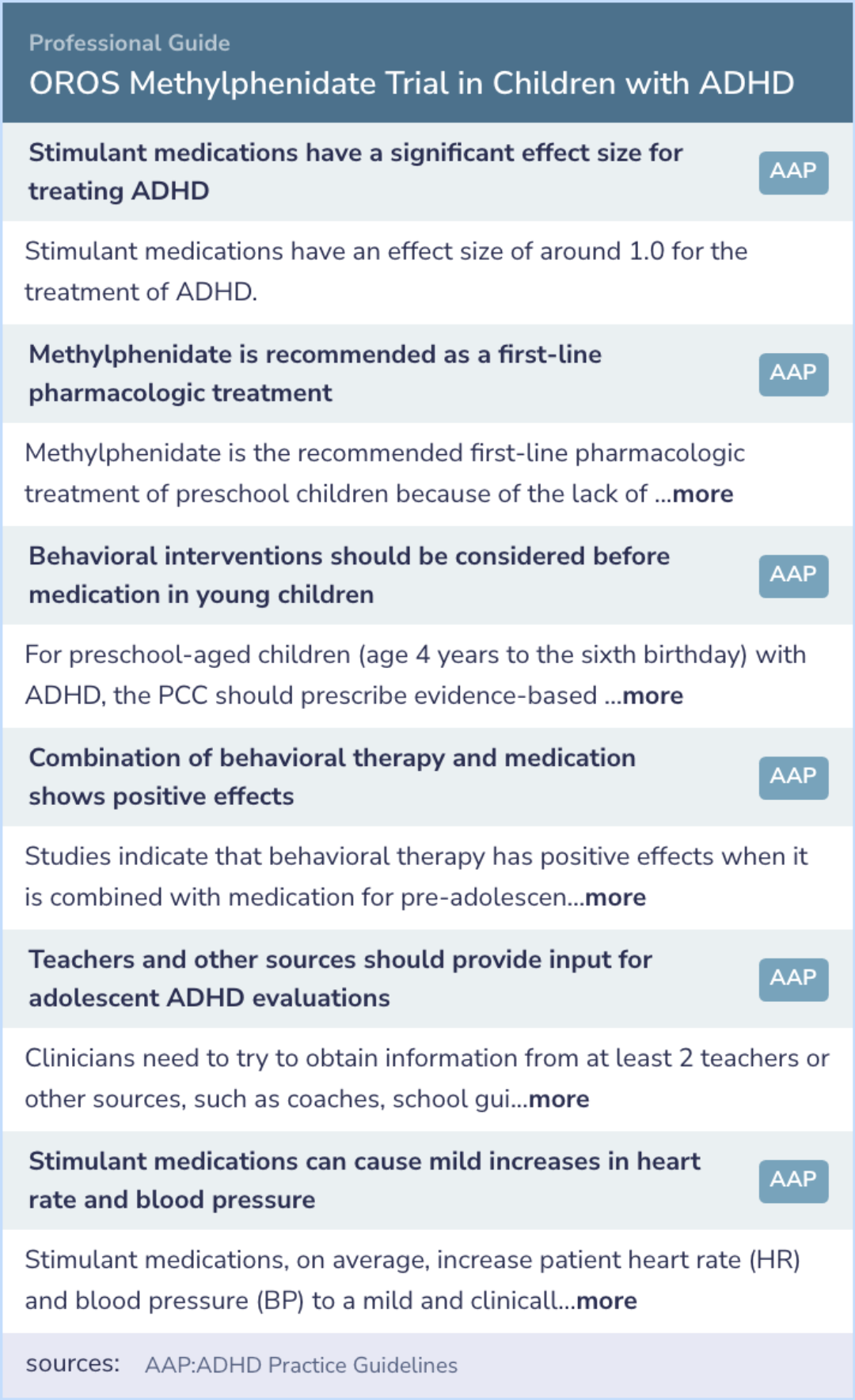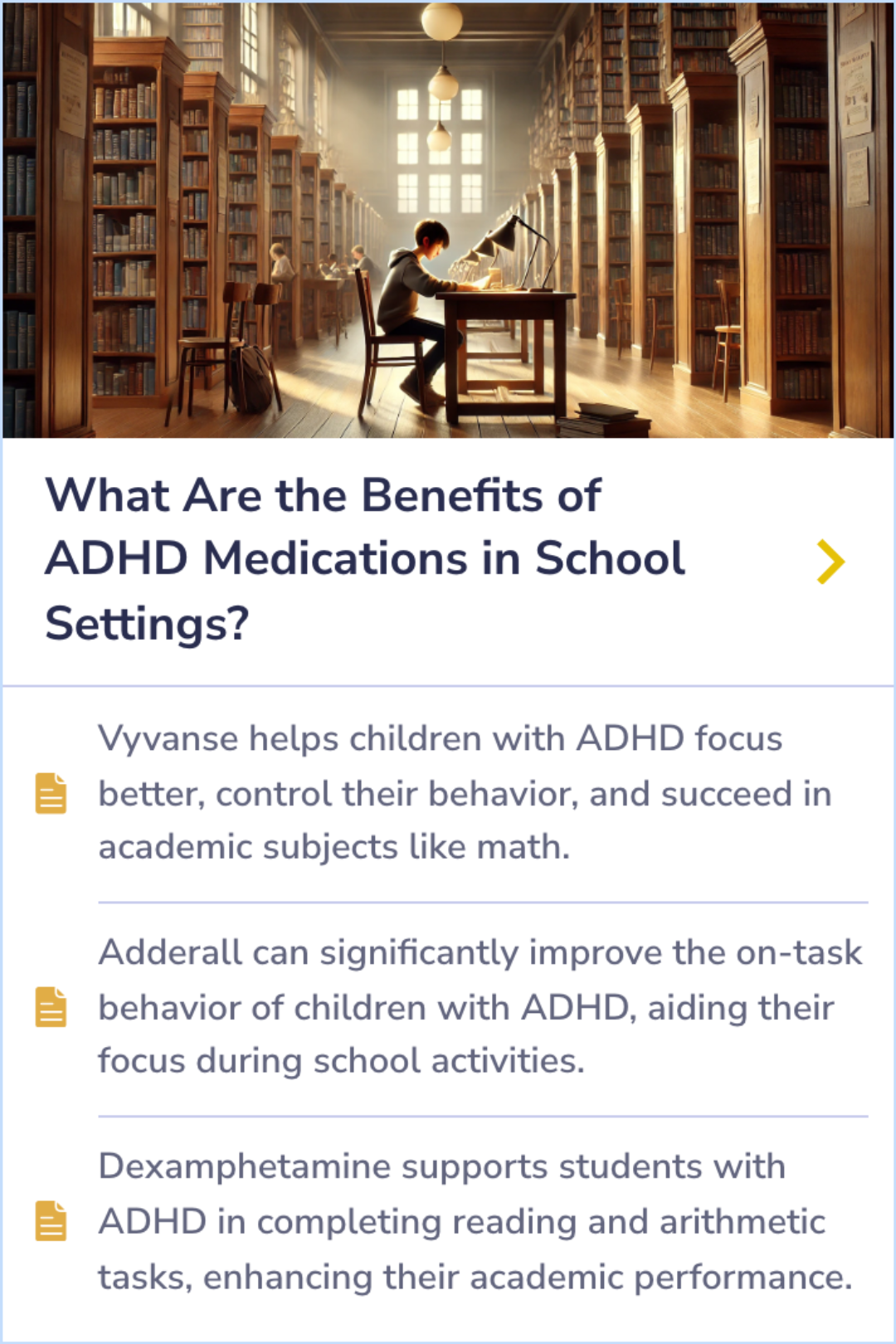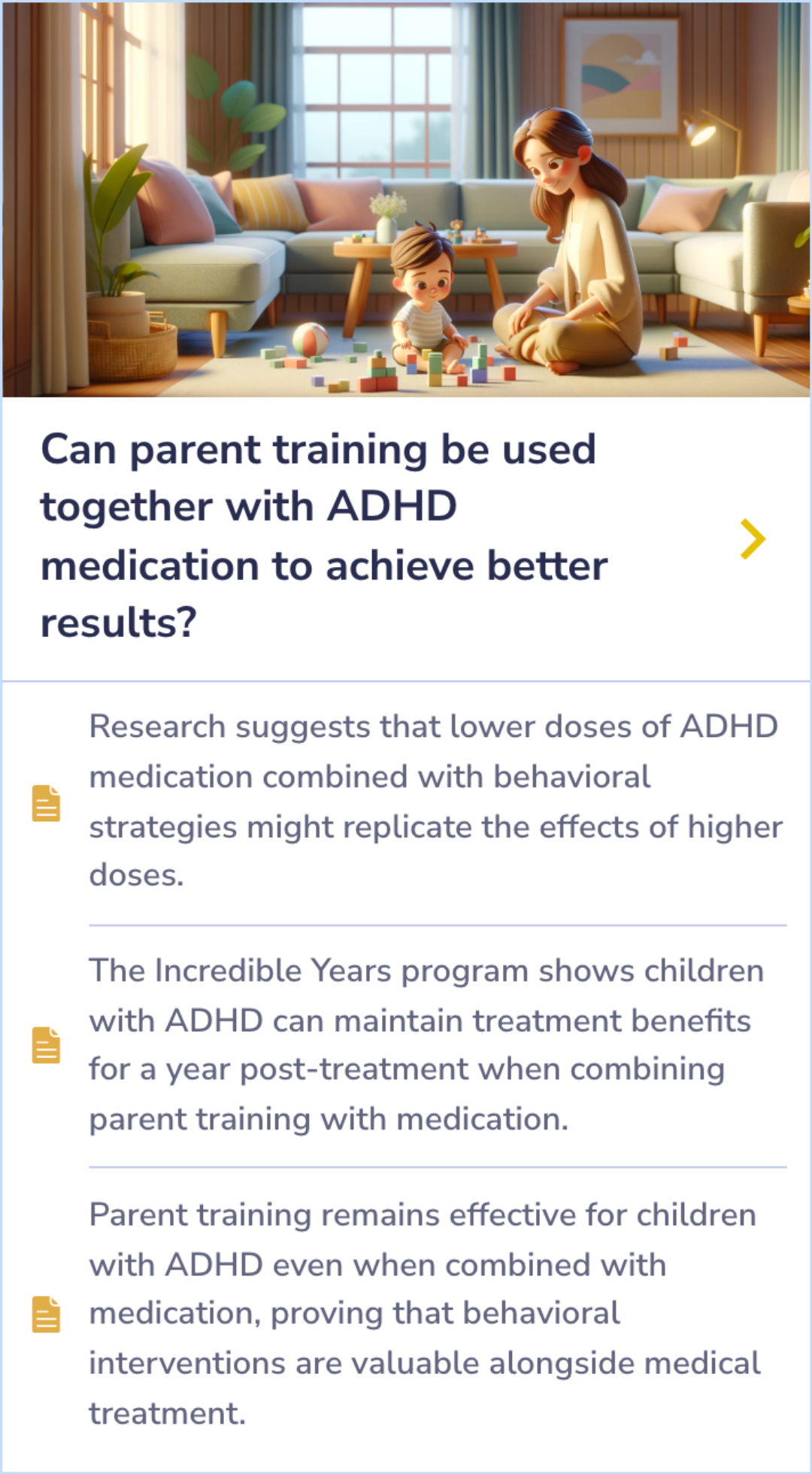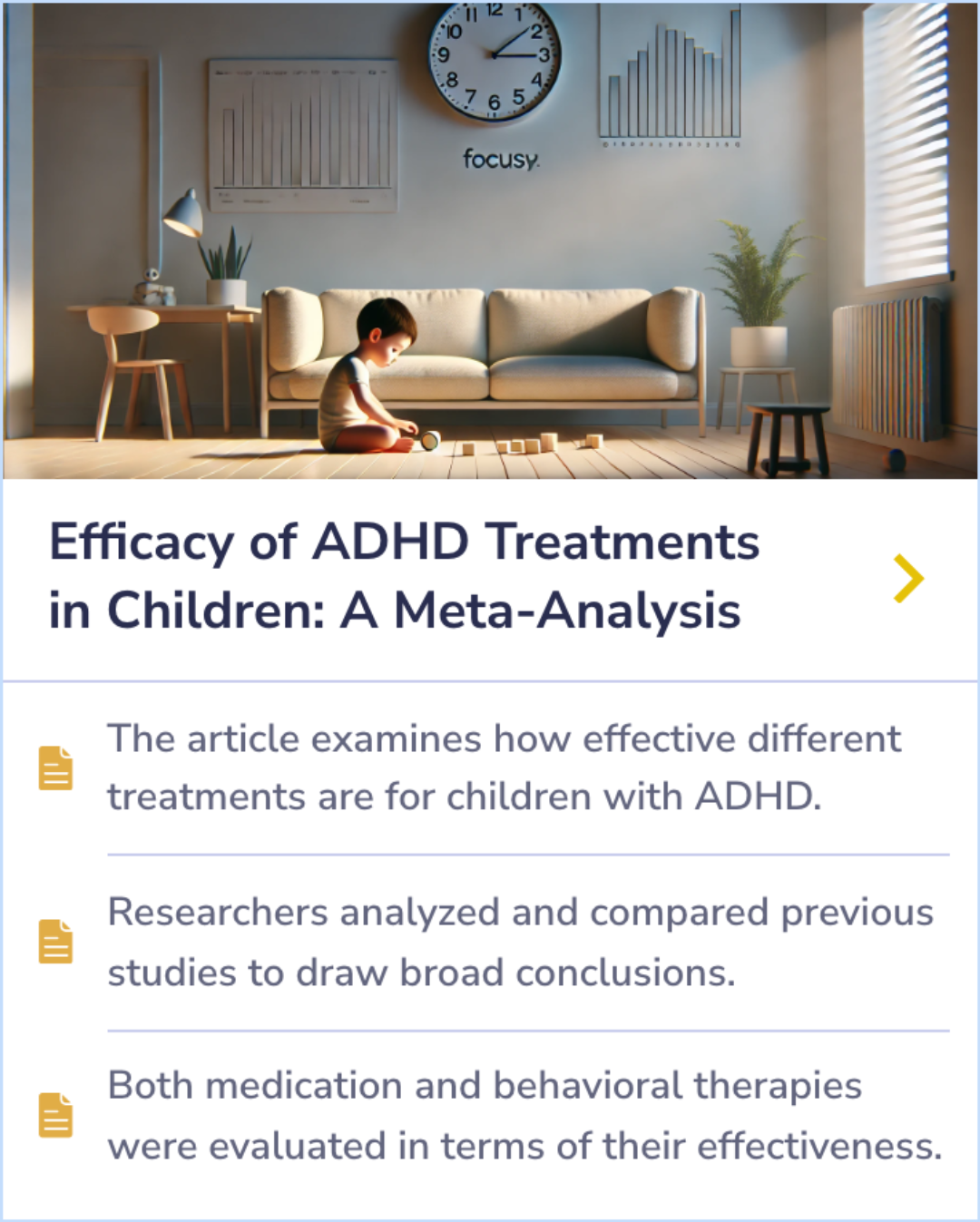Ritalin Paper Database
Visual Abstract
Randomized, controlled trial of oros methylphenidate once a day in children with attention-deficit/hyperactivity disorder
Is Once-Daily Concerta as Effective as Immediate-Release Ritalin for ADHD?
October 17, 2024
author
Wolraich ML, Greenhill LL, Pelham W, Swanson J, Wilens T, Palumbo D, Atkins M, McBurnett K, Bukstein O, August G
journal
Pediatrics
Date Published
2001 Oct
Why link to a visual abstract?
What is a visual abstract?
Original
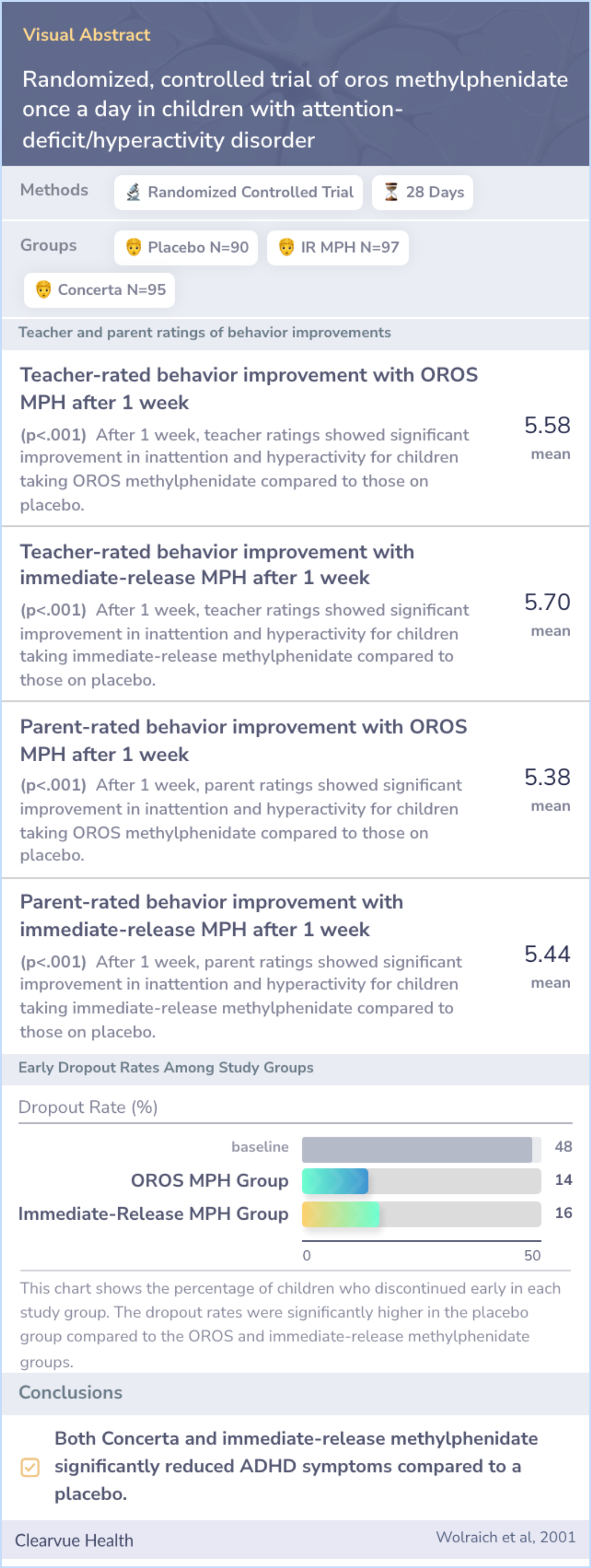
Study Summary
🔬
What They Studied
The researchers aimed to determine the safety and effectiveness of the new once-a-day Concerta formulation for treating ADHD in children.
💡
What They Found
Both Concerta and the immediate-release version of methylphenidate significantly improved ADHD symptoms compared to a placebo.
📚
What This Means
The findings align with current evidence that methylphenidate is effective in managing ADHD symptoms in children.
Study Summary
Study Overview
The study aimed to evaluate the effectiveness and safety of a new once-daily formulation of methylphenidate, known as Concerta, compared to an immediate-release version taken three times a day. The researchers were particularly interested in whether this new formulation could simplify treatment for children with ADHD by reducing the need for medication during school hours, which can often be a source of embarrassment.
The study found that the once-daily Concerta was as effective as the immediate-release version in managing ADHD symptoms. Both versions of the medication significantly improved attention and behavior at school, offering similar levels of effectiveness. However, the convenience of a once-daily dose could offer additional benefits, such as reducing the stigma associated with taking medication during the school day.
The study found that the once-daily Concerta was as effective as the immediate-release version in managing ADHD symptoms. Both versions of the medication significantly improved attention and behavior at school, offering similar levels of effectiveness. However, the convenience of a once-daily dose could offer additional benefits, such as reducing the stigma associated with taking medication during the school day.
Abstract: background
A new once-a-day methylphenidate (MPH) formulation, Concerta (methylphenidate HCl) extended-release tablets (OROS MPH), has been developed. This study was conducted to determine the safety and efficacy of OROS MPH in a multicenter, randomized, clinic...more

Purpose of the Study
"The purpose of this study was to determine the safety and efficacy of OROS MPH qd compared with IR MPH tid and placebo in the community setting."
Potential Benefits
"Because OROS MPH will eliminate the need for dosing in school and after school, it potentially could eliminate the embarrassment that a child may feel when called to report to a school authority for medication."
Efficacy of Once-Daily Dosing
"The convenience of once-daily dosing could provide additional benefits."
Study Summary
Methods
In this study, 282 children aged 6 to 12 years with ADHD were randomly assigned to one of three groups: placebo (90 children), IR MPH taken three times daily (97 children), or Concerta taken once daily (95 children). The trial was double-blind, meaning neither the participants nor the researchers knew which treatment each child received. The study lasted 28 days, and researchers measured outcomes in several areas. Data were analyzed using statistical methods, including analysis of variance and Kaplan Meier estimates for the time until participants stopped the study.
Abstract: methods
Children with attention-deficit/hyperactivity disorder (ADHD; n = 282), all subtypes, ages 6 to 12 years, were randomized to placebo (n = 90), immediate-release methylphenidate (IR MPH) 3 times a day (tid; dosed every 4 hours; n = 97), or OROS MPH on...more

Study Summary
Results
Children who took either Concerta or IR MPH showed significantly greater reductions in core ADHD symptoms compared to those who took the placebo. This improvement was evident by the end of the first week and continued through the end of the study, based on ratings from teachers and parents. There was no significant difference in effectiveness between Concerta and IR MPH. Additionally, 48% of children in the placebo group discontinued the study early, compared to only 14% in the IR MPH group and 16% in the Concerta group.
Abstract: results
Children in the OROS and IR MPH groups showed significantly greater reductions in core ADHD symptoms than did children on placebo. This was true both at the end of week 1 and at the end of treatment on the basis of mean teacher and parent IOWA Conner...more
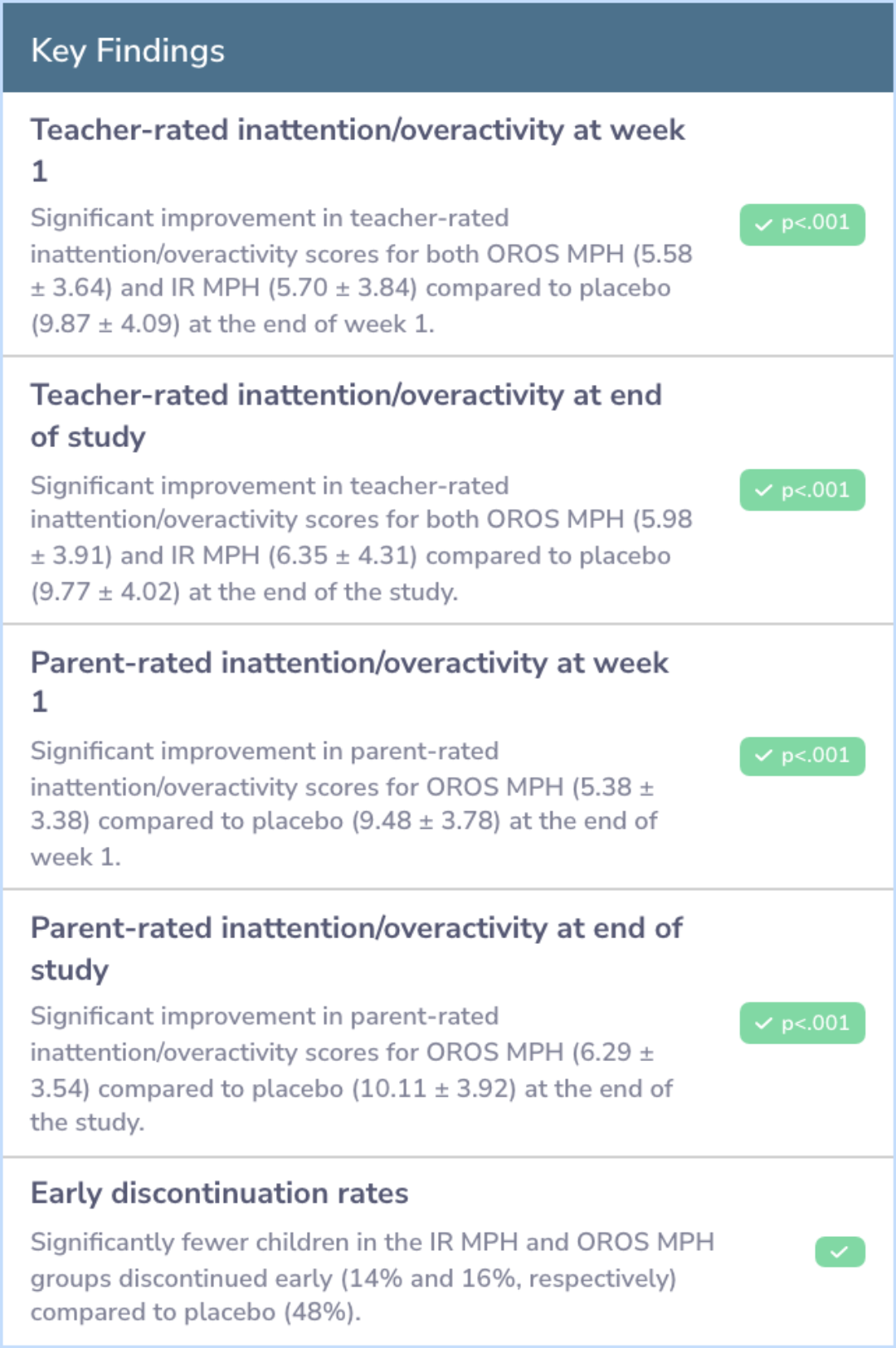
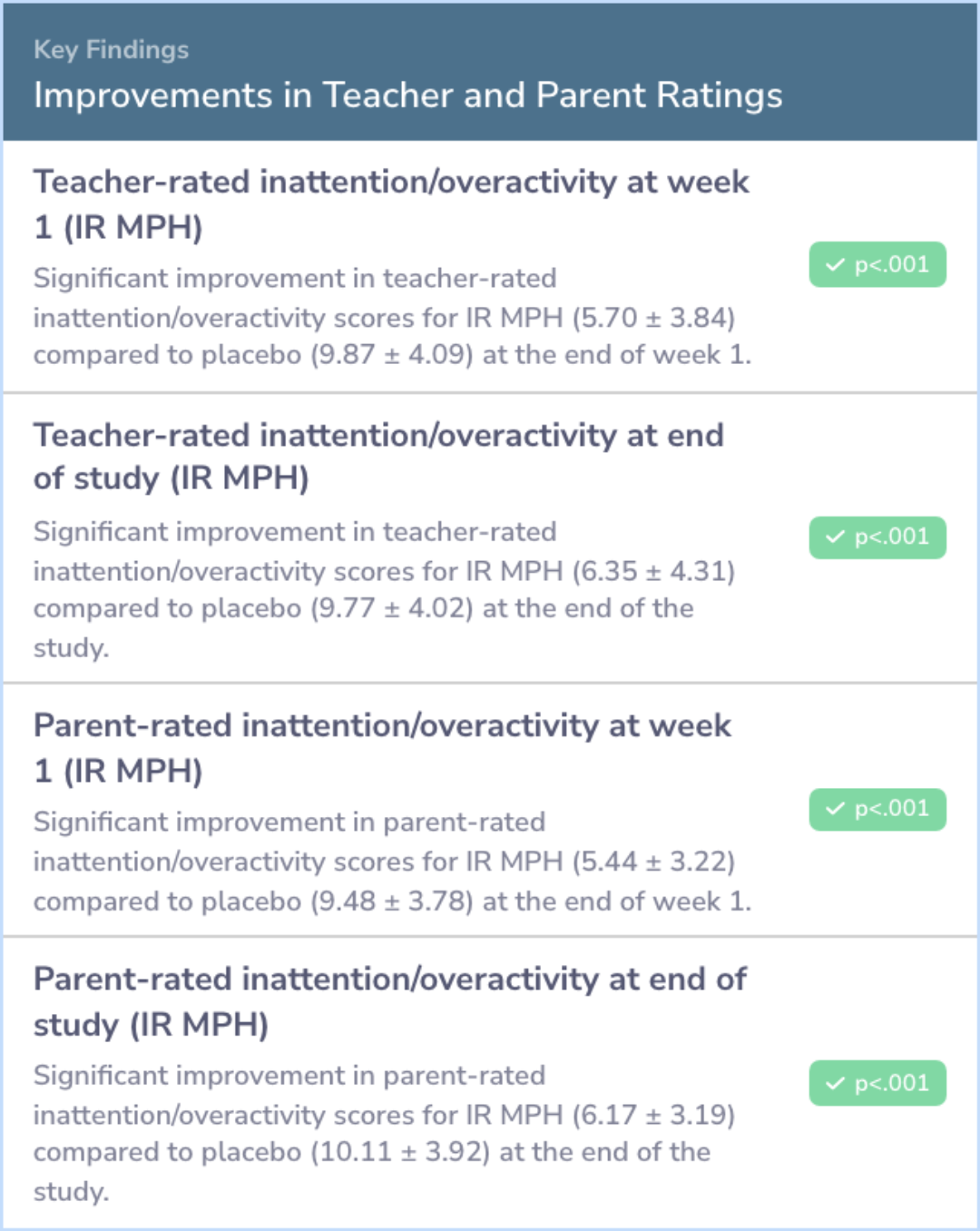
Study Summary
Conclusions
The study concluded that both Concerta, taken once daily, and IR MPH, taken three times daily, were more effective than a placebo in reducing core symptoms of ADHD in children. There was no significant difference in the effectiveness between the two forms of methylphenidate. This suggests that Concerta, with its convenient once-daily dosing, is as effective as the more frequent IR MPH dosing for managing ADHD symptoms.
Abstract: conclusions
For the treatment of core ADHD symptoms, OROS MPH dosed qd and IR MPH dosed tid were superior to placebo and were not significantly different from each other.attention-deficit/hyperactivity disorder, methylphenidate, OROS, Concerta.
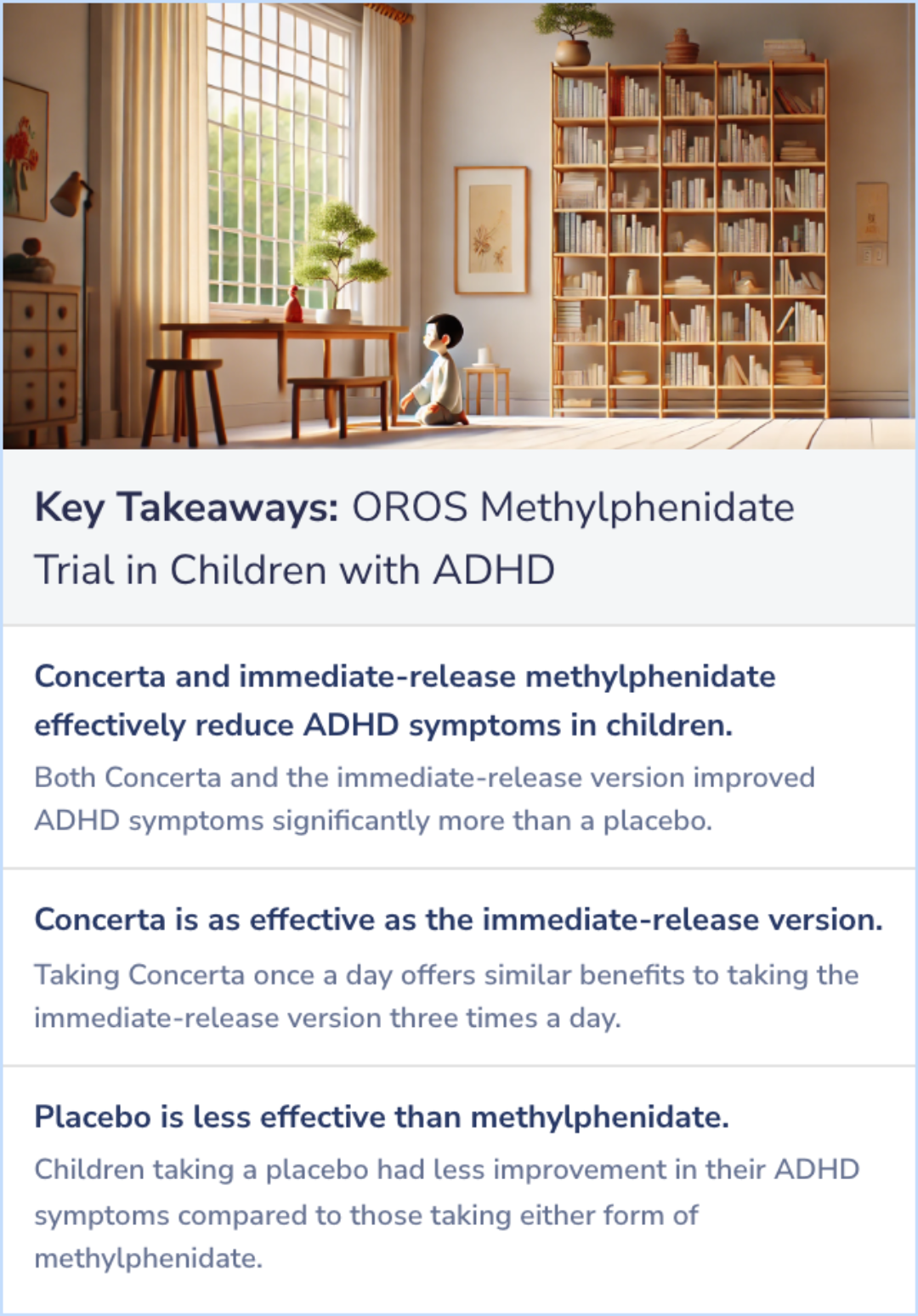
Background Information
Patient Guide
👨⚕️
Methylphenidate: Primary Uses
Methylphenidate is FDA-approved for treating ADHD in children and adults and as a second-line treatment for narcolepsy.
🧒
Methylphenidate Age Limit
Children must be six years or older to be prescribed methylphenidate for ADHD.
🧠
Mechanism of Methylphenidate
Blocks the reuptake of norepinephrine and dopamine, increasing their concentration in the synaptic cleft.
💊
Available Formulations
Available in immediate-release, extended-release, and sustained-release formulations.
📏
Maximum Dosage
Dosage must be carefully managed, with the maximum daily dose not exceeding 72 mg for extended-release tablets.
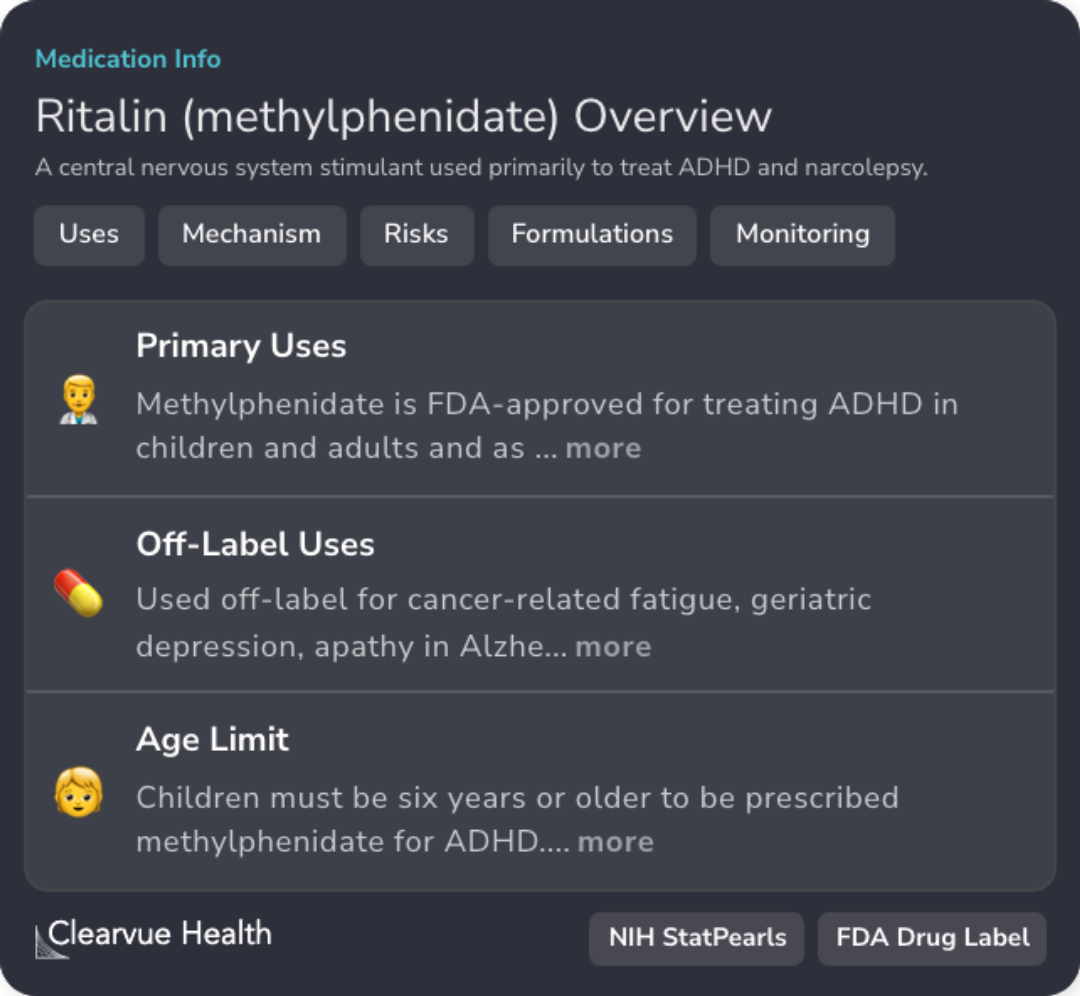
Professional Guide
Expert Opinion: OROS Methylphenidate Trial in Children with ADHD
The findings suggest that OROS MPH and IR MPH are effective treatments for core ADHD symptoms over placebo.
Current professional recommendations indicate that stimulant medications, such as methylphenidate, have a significant effect size for treating ADHD, underscoring their efficacy.
Methylphenidate is recommended as a first-line pharmacologic treatment for preschool children, although for very young children, evidence-based behavioral interventions should be considered first.
Additionally, combining behavioral therapy with medication shows positive effects in pre-adolescent children.
For optimal evaluation of adolescent ADHD, clinicians should gather information from multiple sources, including teachers and coaches, and screen for comorbid conditions such as anxiety or learning disorders.
Finally, while stimulant medications can cause mild increases in heart rate and blood pressure in most patients, clinicians need to monitor these vital signs due to potentially substantial increases in a subset of individuals.
Current professional recommendations indicate that stimulant medications, such as methylphenidate, have a significant effect size for treating ADHD, underscoring their efficacy.
Methylphenidate is recommended as a first-line pharmacologic treatment for preschool children, although for very young children, evidence-based behavioral interventions should be considered first.
Additionally, combining behavioral therapy with medication shows positive effects in pre-adolescent children.
For optimal evaluation of adolescent ADHD, clinicians should gather information from multiple sources, including teachers and coaches, and screen for comorbid conditions such as anxiety or learning disorders.
Finally, while stimulant medications can cause mild increases in heart rate and blood pressure in most patients, clinicians need to monitor these vital signs due to potentially substantial increases in a subset of individuals.
Evidence Summary
Improved Focus and Academic Performance with ADHD Medications
ADHD medications like Vyvanse, Adderall, and Dexamphetamine improve focus, on-task behavior, and task completion in students, leading to better academic performance and classroom success.
Vyvanse helps children with ADHD focus better, control their behavior, and succeed in academic subjects like math.
Adderall can significantly improve the on-task behavior of children with ADHD, aiding their focus during school activities.
Dexamphetamine supports students with ADHD in completing reading and arithmetic tasks, enhancing their academic performance.
Vyvanse helps children with ADHD focus better, control their behavior, and succeed in academic subjects like math.
Adderall can significantly improve the on-task behavior of children with ADHD, aiding their focus during school activities.
Dexamphetamine supports students with ADHD in completing reading and arithmetic tasks, enhancing their academic performance.
Evidence Summary
Combining Medication and Behavioral Strategies for ADHD
Combining lower doses of ADHD medication with behavioral strategies might replicate higher dose effects.
Research suggests that lower doses of ADHD medication combined with behavioral strategies might replicate the effects of higher doses.
Parent training remains effective for children with ADHD even when combined with medication, proving that behavioral interventions are valuable alongside medical treatment.
Research suggests that lower doses of ADHD medication combined with behavioral strategies might replicate the effects of higher doses.
Parent training remains effective for children with ADHD even when combined with medication, proving that behavioral interventions are valuable alongside medical treatment.
Evidence Summary
Comparing ADHD Treatments: Medications vs. Behavioral Therapies
The review examines how different treatments affect children with ADHD.
It looks at multiple studies to assess both medications and behavioral therapies.
By comparing these studies, researchers aim to understand their overall effectiveness.
The goal is to see which treatments work best for managing ADHD symptoms in children.
It looks at multiple studies to assess both medications and behavioral therapies.
By comparing these studies, researchers aim to understand their overall effectiveness.
The goal is to see which treatments work best for managing ADHD symptoms in children.
